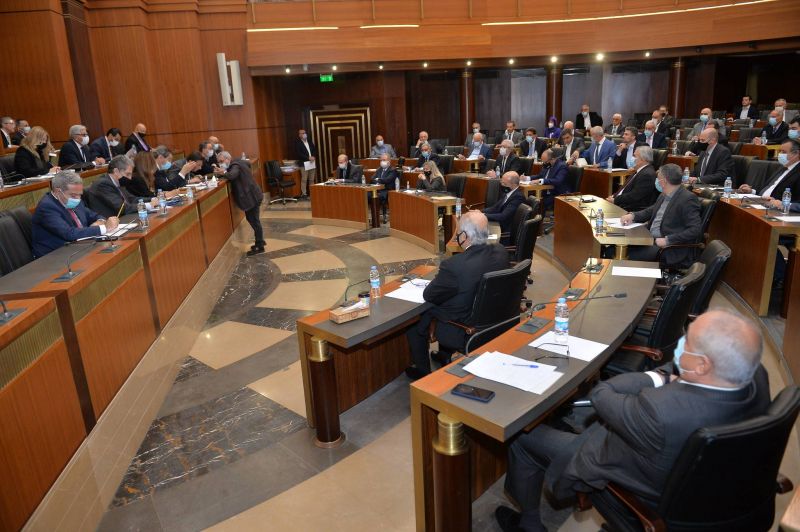
MPs and officials met Wednesday behind closed doors. (Parliament/Ali Fawwaz)
BEIRUT — A raucous meeting of parliamentarians on Wednesday to discuss subsidies for essential imports and the central bank’s rapidly dwindling reserves ended with no result.
One MP’s shouts could be heard from outside the chamber, where Deputy Speaker Elie Ferzli (FPM bloc/W. Bekaa-Rashaya) was chairing a special joint committee session.
The hubbub was over the looming problem of Banque du Liban’s declining dollar stocks — and the disaster that awaits Lebanon once they are depleted. MPs, along with ministers and officials from BDL and the World Bank, had assembled in closed session to address the issue.
Among other things, BDL’s remaining dollars are currently being used to subsidize imports of fuel, wheat, medicine and other goods through special exchange mechanisms that offer a steep discount from the market rate.
These subsidy programs make staples more affordable, but also mean that BDL’s foreign currency reserves are declining at an alarming pace. Since exchange subsidies were introduced at the end of September 2019, reserves have fallen by some $13.5 billion to around $18.3 billion, according to BDL data and statements from the governor.
While that precipitous drop is not due entirely to subsidies, MP and former Finance Minister Ali Hasan Khalil (Amal/Marjayoun-Hasbaya) said Wednesday that they were draining BDL’s coffers by $7 billion per year.
Between subsidies and other sources of dollar drainage, the pace would mean the central bank would run out of dollars by late next year, according to a September report from Goldman Sachs. The result would be a catastrophic increase in the prices of essential goods.
But BDL’s governor, Riad Salameh, has said the deadline is coming even sooner.
On Tuesday, he reiterated that he would not dip into banks’ mandatory reserves at BDL to preserve the subsidies, telling Saudi-owned TV station Al-Hadath that the central bank currently holds $800 million in non-mandatory reserves — enough to cover imports of essential goods for just two months.
The reserve requirement is a central bank regulation that sets the minimum amount of funds that banks must deposit at BDL. In Lebanon, banks have to keep a minimum reserve of 15 percent of their total dollar deposits, currently valued around $17.5 billion for the sector, at the central bank.
Salameh says that since this 15 percent reserve ultimately belongs to depositors, he will not touch it.
The governor also claims that he cannot touch it. Legally, however, he can change the requirement. Karim Daher, a lawyer who specializes in public finance and tax law, told L’Orient Today that “decreasing the percentage of mandatory reserves doesn’t require a new law; it’s BDL that decides” the reserve requirement ratio.
But regardless of when the dollars run out, the consequences will be severe. “Lebanon would witness a further rise in inflation and more rapid erosion of living standards, as the importation of basic goods would no longer be able to be funded at the official rate,” according to the Goldman Sachs report. “With the possibility of greater currency depreciation, domestic prices would increase further, plunging more of the population into poverty.”
In August, the UN’s Economic and Social Commission for Western Asia estimated that over 55 percent of the population was already living in poverty.
The Goldman Sachs report added, “Should the current situation persist to the point where reserves are depleted and the economic situation declines further, there is a clear risk that social and political stability would intensify, a particularly worrying situation given the country’s deep sectarian divisions and history of internecine strife.”
In other words, MPs and government officials have good reason to be worried.
“If people are hungry, will they have mercy on us? On the political class and all the political parties?” MP Hady Hobeiche (Future/Akkar) asked after Wednesday’s committee session.
“No one is going to have mercy on anyone. Look at other countries that reached this point — which we have reached and potentially worse — look at what happened there: huge protests and millions hit the streets,” he said.
But those worries did not translate into action during the meeting.
The cabinet should have provided a “practical proposal, but that did not take place. What was going on in the chamber was statements, [political] stances and not discussions,” according to MP Ibrahim Kanaan (FPM/Metn), the chair of Parliament’s Finance and Budget Committee.
Kanaan added that “in the absence of a practical proposal from the cabinet and BDL, who are responsible for this situation, discussing [the subsidy program] will be useless, and the members of Parliament support my words.”
BDL’s Central Council is set to address the issue at a meeting Thursday. The cabinet, which resigned in the aftermath of the Aug. 4 Beirut port explosion, has little room to act outside of basic caretaker functions.